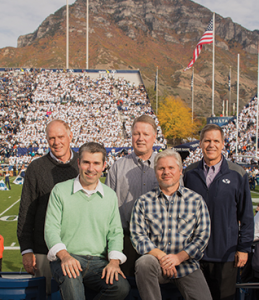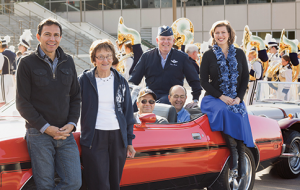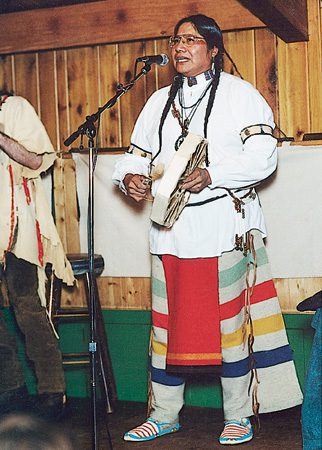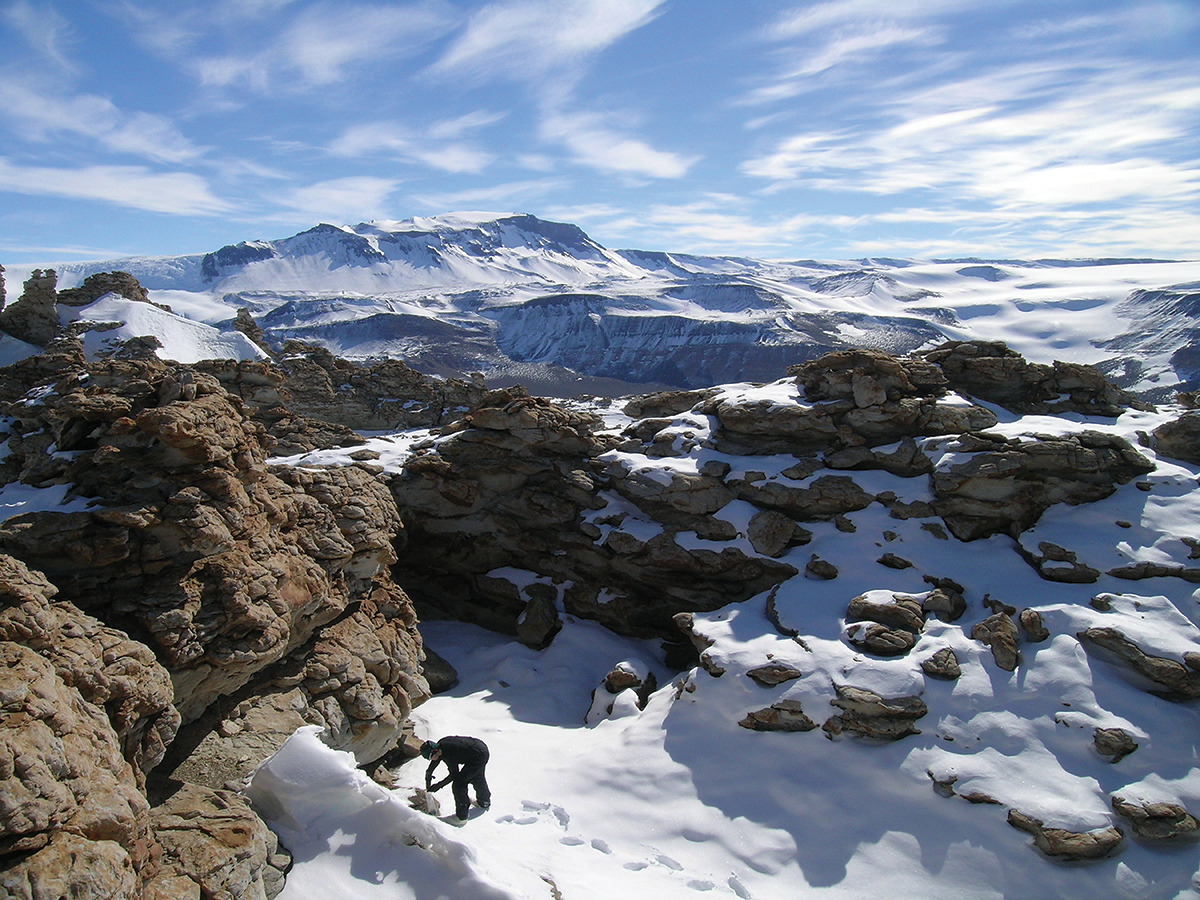Honored with Alumni Achievement Awards during Homecoming 2013, these 11 alums represent the finest from each college and the Kennedy Center.
Education
Richard E. Culatta (BA ’04, MS ’07)
Herndon, Va.
Director of the Office of Educational Technology, U.S. Department of Education
Why education: A high school algebra class. “I remember sitting there and thinking, ‘There has to be a better way than this. . . . From then on, I knew I wanted to do something in education.”
Worst BYU grade: Zoology. “It was brutal! . . . I actually burned the textbook when it was over. . . . It was cathartic.”
Success secret: “Small projects, quickly iterating, and rapidly scaling are, I found, ways to get much more done than waiting on the big giant thing that may never actually come through.”
Hobby: Flying planes. “My daughter is my little copilot. She helps me make sure I’m remembering air speeds and all that sort of stuff.”
Next up: “In four years, when all students across the country have access to broadband Internet in their classrooms, then I’ll tell you what the next mountain is.”
Driving force: “That urgency of knowing that we actually have a shot at making a difference. We actually can completely change people’s lives. So, let’s go!”
Speaker notes: “The future’s already here—it’s just not very evenly distributed.”
Humanities
Brigham G. Taylor (BA ’92)
La Crescenta, Calif.
Executive vice president of creative development and production at Disney
BYU lesson learned: “[Pursue] something that . . . intrigues you, and your odds of success go way up.”
Y nostalgia: “I miss the uninterrupted time to study things you enjoy, which is something you just don’t get outside of your scholastic career.”
Career inspiration: “A roommate told me to get involved
in the Sundance Film Festival, so I went up to Park City and volunteered taking tickets. I’ve been back to the festival every year for 23 years.”
Working at Disney: “You get to work on things you love and you get to work with people you admire, which ultimately make it a lot less like work and a lot more like fun.”
Hobby: “Most weekends my wife and I see a show, and I don’t get sick of that, which is good.”
Favorite recent movie: “Gravity, which is a stunning cinematic experience. . . . It was a really visceral experience, which the best movies are.”
Speaker notes: “A lot goes wrong in moviemaking—in any type of storytelling, for that matter. Every now and then, things can go right, and when they do, it can add something meaningful to the cultural history.”
Physical and Mathematical Sciences
Philip S. Low (BS ’71)
West Lafayette, Ind.
Distinguished professor of chemistry and director of the Center for Drug Discovery at Purdue University
Why chemistry: Low’s father, Philip F. Low (BS ’43), a distinguished chemistry professor at Purdue, recommended chemistry as broad preparation for a variety of careers—from medicine to business to science. The younger Low stuck with chemistry and eventually landed a job at the same university as his father.
Worst BYU grade: A C+ in calculus. “I took calculus from Harvey Fletcher (BS 1907), who was a very famous BYU scientist. He taught an excellent course, but, um, I was a little bit distracted by lots of fun things.”
BYU lesson learned: “Hard work pays off.”
Driving force: “I see [my work] as, perhaps, a calling. It is something that the Lord has entrusted with me, and I believe there is an expectation to deliver.”
Professional rewards: “It’s very rewarding to see the gratitude in patients’ faces.”
Next up: “I’ve started a company that develops tumor-targeted fluorescent dyes to basically illuminate tumor tissue and enable the surgeon to distinguish the malignant tissue from the adjacent healthy tissue. . . . I think it has the potential to revolutionize surgery.”
International Studies
Matthew H. Tueller (BA ’81)
Provo
U.S. ambassador to Kuwait
Success secret: “As one of 10 children being raised abroad [with a father in the Foreign Service], . . . it really put the onus on the family, on parents teaching us to be self-reliant and to work hard.”
Driving force: “I have a hypercompetitive nature. . . . I came from a family where no one wanted to bring home a report card with anything less than an A. It was not my parents who were pushing but the siblings.”
Secret skill: “I’m a master of arcane trivia. . . . My family would say I am good at appearing to be quite expert in fields that I am not really expert in.”
Professional rewards: “To represent our . . . country abroad, to explain it, to promote its values, to find ways in which you can leave an imprint on the world. There’s an element of patriotism in the job.”
On the Middle East: “It is going to require that we work hard with allies in the region that share similar interests to win this generational battle between the forces of moderation and the forces of extremism. . . . The more people we can have engaged in the takeoff, the more people we will have engaged in the landing because the landing is what we are focused on.”
Marriott School
Richard K. Herlin (BS ’80, MAcc ’80)
Midland, Mich.
Partner at Deloitte
Glory days: “During one BYU junior varsity football game, . . . though my position was tight end, I was asked to play quarterback. I had some experience playing quarterback in high school. We [ended] up winning the game.”
Worst BYU grade: “Ironically, my worst grade was in an English class taught by a Chinese graduate assistant.”
Laughable goal: “When my wife and I first got married, we wanted to have 13 kids. We later scaled this back.”
Student labor: “As a freshman I was an usher at the varsity football games.”
Professional rewards: “I want to leave a legacy I [will] be happy with when I leave Deloitte. Being in a senior level position at the firm, I can serve as a mentor to people and have a positive impact.”
Speaker notes: “Just as we rely on a GPS to help us go where we want to, we all should have our own moral compass to guide us in our careers and lives. Your values can have a positive impact on those who you work with. Ethics and integrity are the absolute foundation in which careers and firms are built.”
Engineering and Technology
Brig. Gen. David A. Harris (BS ’86)
Fort Walton Beach, Fla.
U.S. Air Force brigadier general and flight test navigator
Career inspiration: “My dad. He had a pilot’s license at a younger age than I had a driver’s license.”
Best BYU class: James H. Polve’s thermodynamics class. “I was never so happy to get a B in my whole life.”
BYU lesson learned: “You can either discipline yourself, or someone else is going to discipline you. Disciplining yourself leads to freedom.”
Hobby: While in Texas learning to navigate the B-1 bomber, Harris had a lot of time alone in his visiting officer’s quarters. So he purchased an oil-painting starter set and how-to book. “I pulled a picture of one of my daughters out of my wallet and said, ‘Well, how hard can it be?’” Now portraits he has painted of his four daughters adorn the walls of his home.
Driving force: “In the culture of my family and in the Air Force, if it’s not excellent, it’s not good enough. My dad was a perfectionist in everything he did. It wasn’t a race to see how fast you could get it done—it was how perfectly you could get it done.”

Alumni Achievement Award recipients (from left) Philip Low, Richard Culatta, Richard Herlin, Brigham Taylor, and Matthew Tueller celebrate their return to campus by cheering on the Cougars at the BYU football Homecoming game.
Family, Home, and Social Sciences
D. Nathan Sheets (BA ’89)
Rockville, Md.
International economist at Citigroup
Why economics: “I really liked thinking about what makes people do what they do and what public policy is, and I was interested in how companies run and finance and all that.”
Student labor: As a research assistant for economic history professor Clayne L. Pope (BFA ’65), Sheets studied the journals of Utah pioneers. “It was absolutely fantastic from the perspective of getting a sense of who they were, what they gave up, and, on the other hand, what they were able to achieve.”
Y nostalgia: “I miss the way we’re able at BYU to weave in the spiritual things with secular things. It’s a reminder that these things are fully and vitally interrelated.”
Professional rewards: “International economics is infinitely humbling. . . . That sense of awe and mystery about it, being bigger than I am, bigger than I can think, is great.”
Secret skill: “My talent is laughing at my own jokes.”
Speaker notes: “If we believe that everybody deserves absolutely the best health care that money can buy, then we need to be prepared to pay more taxes to cover it. And that’s the debate that I don’t think we’re having.”
Fine Arts and Communications
Arthur “Art” Rascon (BA ’85)
Houston
Award-winning journalist
Y nostalgia: “The atmosphere of a school where prayers are said, songs are sung, where everyone is essentially after a common goal. . . . You don’t find that in the business world. . . . It can only be found here.”
Success secret: “Establish in your mind that a career is not the most important thing out there.”
Hardest interview: Manuel Noriega, deposed dictator of Panama, while in prison. “He ended up getting very angry and irate over the interview. I was . . . asking direct questions. . . . But the answers came out the way they should have.”
Driving force: “I just do not like leisure time. When I’m even walking from one point to another, the kids and my wife always tell me I’m walking too fast. I just like to make things happen.”
Recent read: Dr. Seuss’s Oh, the Places You’ll Go! “I just read it a few days ago again, and I thought, ‘This is brilliant!’”
Speaker notes: “Follow the impressions of the Spirit. The Spirit will bring you life.”
Law School
Hannah Clayson Smith (JD ’01)
Dallas
Senior counsel at the Becket Fund for Religious Liberty
Student labor: Research assistant for W. Cole Durham Jr. at the BYU International Center for Law and Religion Studies hosting international government officials and academics at the Law School. “It was an amazing opportunity to meet so many influential people from around the world.”
Why law: “In sixth grade my school’s debate coach chose me to be the lawyer in a classroom mock trial. I was hooked. From that point on, I knew I wanted to be an attorney.”
Professional rewards: “It is deeply rewarding as an attorney to advocate for a cause—religious freedom—in which I believe so strongly and which has such significant personal consequences for so many people of all faiths.”
Driving force: “Our Heavenly Father has given us one magnificent life to live, and I want to live it to the fullest!”
Recent read: No Higher Honor: A Memoir of My Years in Washington, by Condoleezza Rice
Speaker notes: “Tremendous work has already been accomplished [to promote religious freedom]. But there is great work that lies ahead. I urge you to consider the ways in which you can stand up for religious freedom.”

Winners of Alumni Achievement Awards, (from left) Art Rascon, Sandra Mangum, Craig Meyers (seated), David Harris, Nathan Sheets (seated), and Hannah Smith enjoy celebrity status in the 2013 Homecoming parade.
Life Sciences
Craig M. Meyers (BS ’82, MS ’84)
Hummelstown, Penn.
Distinguished Professor of Microbiology and Immunology at Pennsylvania State University
Best BYU class: Virology with F. Brent Johnson (BS ’66, MS ’67, PhD ’70). Second favorite? Film appreciation. “We’d just go to the theater and watch a movie every week.”
Student labor: “I [worked] with Dr. Marcus M. Jensen on the turkey farms in Sanpete County with turkey vaccines. It was a job, but it wasn’t like a job. That’s how I feel now about what I do: I have a job, but it’s what I like doing.”
Hobby: Swimming. “I’ve competed in the YMCA national meet and some regional meets and actually have won ribbons. Every time I get up on the blocks, I wonder if I’m too old for this.”
Next up: “We’re working on a cure for breast cancer, so we’re trying to get the funding to move it into clinical trials.”
Speaker notes: “When I did this study [on growing human papillomavirus in culture], nobody believed that it would work. . . . Sometimes naïveté works in science. You get down with so much dogma that you’re afraid to try new things. This is what drives science, and this is where things get real exciting.”
Nursing
Sandra Stonehocker Mangum (BS ’58, BA ’59)
Orem, Utah
Retired BYU nursing faculty and humanitarian
Why nursing: “When I was 4 years old, I’d bring home birds with broken wings and mangy, sick cats and try to heal everything. My dolls had pencil-mark incisions on their abdomens.”
Student labor: At LDS Hospital in Salt Lake City. “The first two patients I ever cared for died the day after, and I almost reconsidered becoming a nurse.”
Y nostalgia: “Because my class of 30 nurses were working and sleeping [at LDS Hospital], we stuck together and had a lot of good times. . . . We still get together about once a year. This year is our 55th anniversary from graduating.”
Professional rewards: “Nurses develop an ability to tell what patients and their families are thinking or feeling without asking—to understand different people and see what others might not notice.”
Hobby: Playing the harp. “I play for my own enjoyment, and I’m not awesomely good at it, but I will play for others if I am asked.”
Speaker notes: “Develop and keep a caring attitude. Make that attitude primary in every hour of working. Being patient-centered, not job-centered or self-centered, will take a person far and create joy in every minute.”









